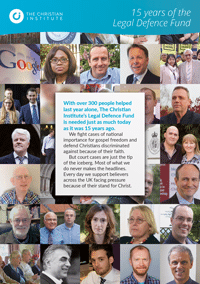Cornerstone Fostering and Adoption
Background
In 2019 Cornerstone’s fostering service was downgraded from “Good” to “Requires Improvement”, threatening its reputation and continued existence as a Christian charity.
The regulator Ofsted accused England’s only evangelical Christian fostering agency of unlawful discrimination because it only recruits evangelical Christian carers.
It also took issue with Cornerstone requiring its carers to abide by its code of conduct on living consistently with the charity’s Christian beliefs about marriage between a man and a woman.
In its inspection report, Ofsted demanded that the agency abandon its religious ethos.
Supported by The Christian Institute, Cornerstone mounted a legal challenge.
Ruling for religious liberty
On 7 July 2020, the High Court ruled that Ofsted was wrong to try to force Cornerstone to work with non-evangelical Christian carers.
The judgment states: “Cornerstone is permitted to exclusively recruit evangelical Christian carers because of the exemption in [the Equality Act 2010] for religious organisations.” And contrary to Ofsted’s allegation, it also states that requiring carer applicants to be evangelical “does not violate” human rights law.
This confirms the freedom of Christian organisations to provide activities in line with their statement of faith.
The Judge made an Order that:
1. The Claimant’s application for judicial review is dismissed; save that the claim in respect of the Defendant’s decision that the Claimant’s foster carer recruitment policy breaches Article 14 read with Article 8 of the European Convention on Human Rights (the Convention), insofar as it requires foster carers to be evangelical Christians (the Decision), is allowed.
2.There be a declaration that the Decision was wrong as a matter of law and that the Claimant’s foster carer recruitment policy does not violate Article 14 read with Article 8 of the Convention insofar as it requires foster carers to be evangelical Christians.
Sexual orientation
However, the Court also said that Cornerstone cannot require carers to abide by its Christian beliefs on appropriate sexual conduct. The judge ruled that the exception in the Equality Act 2010 permitting religious organisations to impose restrictions on grounds of sexual orientation does not apply to Cornerstone.
This hinged on his finding that Cornerstone recruits its carers on behalf of, and under contract with, local authorities – thus depriving them of the ability to rely on the exception.
Court of Appeal
On 24 September 2021 the Court of Appeal confirmed that an evangelical foster agency can work exclusively with evangelical carers.
It also agreed that Cornerstone had suffered a significant interference with its right to manifest its religious beliefs. These are helpful judgments.
However, the Court sided with Ofsted in its attempt to impose its own definition of “evangelical” on Cornerstone, prompting the agency to seek permission to appeal to the Supreme Court.
PRESS RELEASE
Cornerstone CEO Pam Birtle explains why it challenged Ofsted:
In October 2022 the Supreme Court refused permission to appeal earlier court judgments.
The fight to exist
In 2008 Cornerstone was contacted by the Equality and Human Rights Commission (EHRC) over its long-standing policy of only recruiting evangelical Christian foster carers, after new equality laws came into force. Cornerstone successfully responded with the help of The Christian Institute.
Shortly after, the Charity Commission also questioned its requirement for carers to be committed Christians and demanded proof that it was exempt from religious discrimination law.
The Christian Institute’s legal team helped Cornerstone draft a response to the Charity Commission and in January 2011 the regulator gave the adoption and fostering agency a clean bill of health.
The Commission noted that Cornerstone’s requirement for carers to be committed Christians was lawful on the basis that it seeks to provide a distinctly Christian-based adoption and fostering service.
Without the involvement of The Christian Institute, their legal team and their support financially our doors would have closed. Pam Birtle, Cornerstone General Manager
The Institute’s Solicitor Advocate, Sam Webster, explains the wider significance of the 2011 case:
The positive outcome in this case demonstrated that Christian organisations do not need to compromise their beliefs in order to remain within the law.
The case highlighted how important it is for Christian charities to get their foundational documents right and to apply them in practice in a consistent and faithful way. Sam Webster, Solicitor Advocate, The Christian Institute
Watch/Listen
Evangelical Alliance: ‘Ofsted wrong to penalise Cornerstone’
‘Please pray for Cornerstone’
Why a small fostering agency is challenging Ofsted in the High Court
We help Christians every day
The work of The Christian Institute’s Legal Defence Fund
Exclusive interview with Cornerstone founder Pam Birtle
‘Ofsted’s attempt to secularise Christian fostering agency has failed’
Evangelical Alliance: ‘Ofsted wrong to penalise Cornerstone’
‘Please pray for Cornerstone’
Why a small fostering agency is challenging Ofsted in the High Court
We help Christians every day
The work of The Christian Institute’s Legal Defence Fund
Exclusive interview with Cornerstone founder Pam Birtle
Key Resources
Resources
Press release
Court of Appeal backs Ofsted attempt to re-write meaning of “evangelical” – Supreme Court appeal sought
Press release
High Court rejects Ofsted attempt to force UK’s only evangelical Christian fostering agency to abandon religious ethos
Press release
Christian fostering agency in High Court challenge against Ofsted after hostile report orders them to abandon religious ethos



